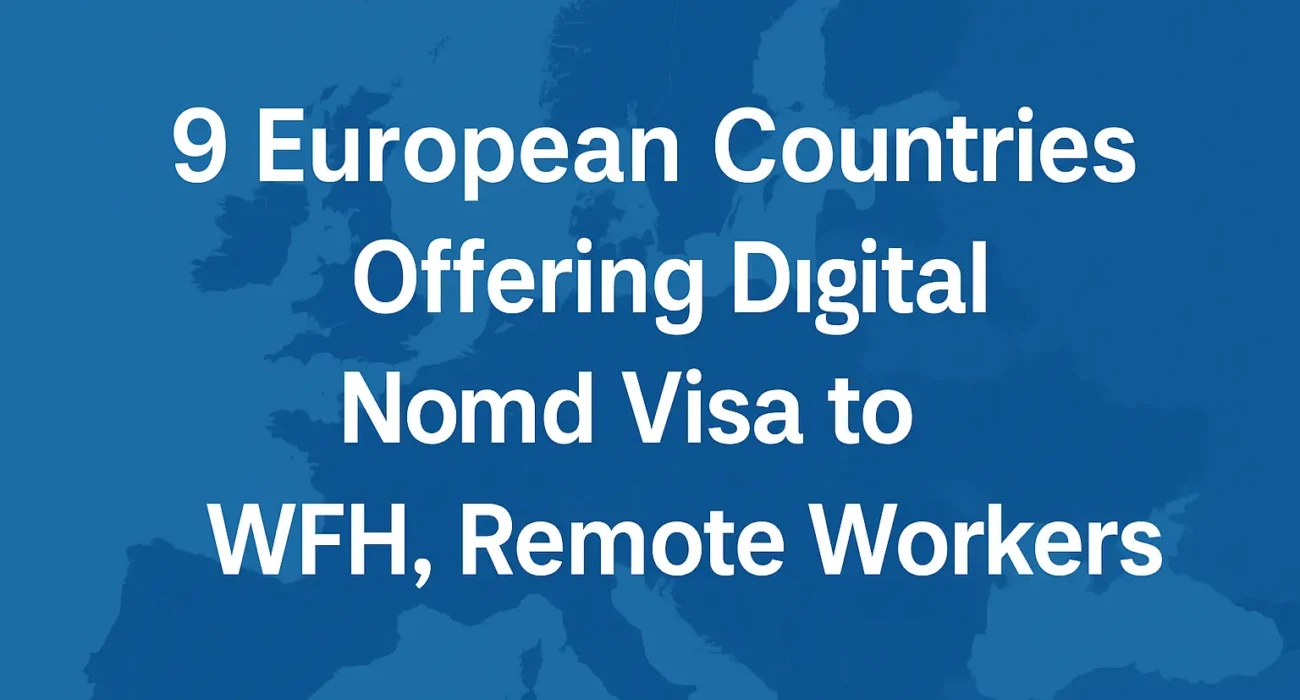9 European Countries Offering Digital Nomad Visa
Remote work has really shaken things up, changing how we see jobs and where we live. Lots of people are becoming digital nomads, working from anywhere and soaking up different cultures. Because of this, some European countries now have Digital Nomad Visas (DNVs), which let freelancers and remote workers live and work there legally for a while.
Thinking about working remotely from Europe in 2025? Here are nine countries with digital nomad visas that might interest you
1. Estonia – The Pioneer of Digital Nomad Visas
Estonia is one of the first countries to launch an official digital nomad visa. The country has built a reputation as a digital-friendly nation with advanced e-governance and a strong start-up ecosystem.
-
Visa Type: Digital Nomad Visa
-
Stay Duration: Up to 1 year
-
Eligibility: Remote workers, freelancers, and business owners working with foreign clients.
-
Income Requirement: Applicants must show proof of steady income at a minimum threshold.
-
Highlights: Estonia’s advanced digital infrastructure makes it one of the best choices for tech-savvy professionals.
2. Greece – Affordable Lifestyle with Tax Benefits
Greece attracts remote workers with its combination of Mediterranean lifestyle, history, and modern amenities. The Greek government introduced its digital nomad visa to make the country a hub for remote workers.
-
Visa Type: Digital Nomad Visa
-
Stay Duration: Initially 12 months, renewable
-
Eligibility: Remote employees, freelancers, or entrepreneurs with clients abroad.
-
Income Requirement: A stable monthly income must be demonstrated.
-
Perks: Remote workers in Greece may also enjoy tax incentives and reduced tax rates for a limited period.
3. Croatia – A Blend of Nature and Affordability
Croatia has become one of the most popular destinations in Europe for remote workers. Its breathtaking coastline, affordable cost of living, and growing nomad community make it a top pick.
-
Visa Type: Digital Nomad Visa
-
Stay Duration: Up to 12 months (non-renewable, but reapplication is possible)
-
Eligibility: Remote professionals who work for companies or clients outside Croatia.
-
Requirements: Proof of income, health insurance, and accommodation.
-
Why Choose Croatia? Low cost of living, friendly community, and scenic landscapes.
4. Malta – English-Speaking Hub for Remote Workers
Malta is another attractive destination for remote workers due to its English-speaking environment, Mediterranean climate, and solid infrastructure.
-
Visa Type: Nomad Residence Permit
-
Stay Duration: 1 year, renewable
-
Eligibility: Remote workers employed by non-Maltese companies or freelancers serving clients abroad.
-
Income Requirement: Applicants must meet a monthly minimum income.
-
Benefits: Easy communication, strong internet connectivity, and excellent healthcare.
5. Hungary – The “White Card” Digital Nomad Visa
Hungary offers a White Card Visa designed for digital nomads, making it a strong option for those who want to live in Central Europe.
-
Visa Type: White Card Visa
-
Stay Duration: Up to 2 years (renewable yearly)
-
Eligibility: Remote employees and freelancers who work for non-Hungarian companies or clients.
-
Income Requirement: Applicants must demonstrate a consistent income.
-
Highlights: Low living costs, vibrant cultural life, and easy access to other EU countries.
6. Iceland – A Unique Short-Term Digital Nomad Visa
Although Iceland offers a relatively short digital nomad visa compared to other countries, it is still an excellent choice for those who want to experience breathtaking landscapes while working remotely.
-
Visa Type: Long-Term Remote Work Visa
-
Stay Duration: Up to 6 months
-
Eligibility: Remote workers who can prove steady income and health insurance coverage.
-
Income Requirement: Higher than in other countries, ensuring applicants can afford the cost of living.
-
Special Feature: Stunning natural beauty and a peaceful working environment.
7. Italy – A New Destination for Digital Nomads
Italy officially launched its digital nomad visa in 2024, making it one of the newer players in this field. With its rich culture, food, and history, it is already a highly attractive location for remote workers.
-
Visa Type: Digital Nomad Visa
-
Stay Duration: 1 year, renewable
-
Eligibility: Professionals working remotely for foreign clients or companies.
-
Income Requirement: Applicants must meet an annual income threshold.
-
Why Choose Italy? Lifestyle, history, cuisine, and easy access to other EU destinations.
8. Czech Republic – The “Freelancer Visa”
The Czech Republic offers a freelancer visa (long-term residence permit for self-employed professionals), making it a flexible option for digital workers.
-
Visa Type: Živnostenský Visa (Freelancer Visa)
-
Stay Duration: 1 year, renewable
-
Eligibility: Freelancers or entrepreneurs working with clients outside the Czech Republic.
-
Requirements: Proof of financial stability, health insurance, and a registered business license.
-
Perks: Central European location, affordable cost of living, and vibrant cities like Prague and Brno.
9. Cyprus – Warm Climate and Family-Friendly Option
Cyprus has introduced its digital nomad visa to attract professionals who want to live on a Mediterranean island with a comfortable climate and a relaxed lifestyle.
-
Visa Type: Digital Nomad Visa
-
Stay Duration: 1 year, renewable up to 3 years
-
Eligibility: Remote workers employed by non-Cypriot companies or self-employed with international clients.
-
Income Requirement: Applicants must meet a monthly income standard.
-
Advantages: Low tax rates, family inclusion option, and an excellent quality of life.
Europe’s becoming a hot spot for those working remotely, mainly because of the new Digital Nomad Visas. Think about it: you could be working from Prague’s old streets or chilling on Malta or Cyprus. There are a lot of great options if you want to mix work with travel.
These nine European countries are planning to roll out digital nomad visas in 2025. It means freelancers, business owners, and remote workers can live and work overseas without the usual legal headaches. Sounds good, right?




